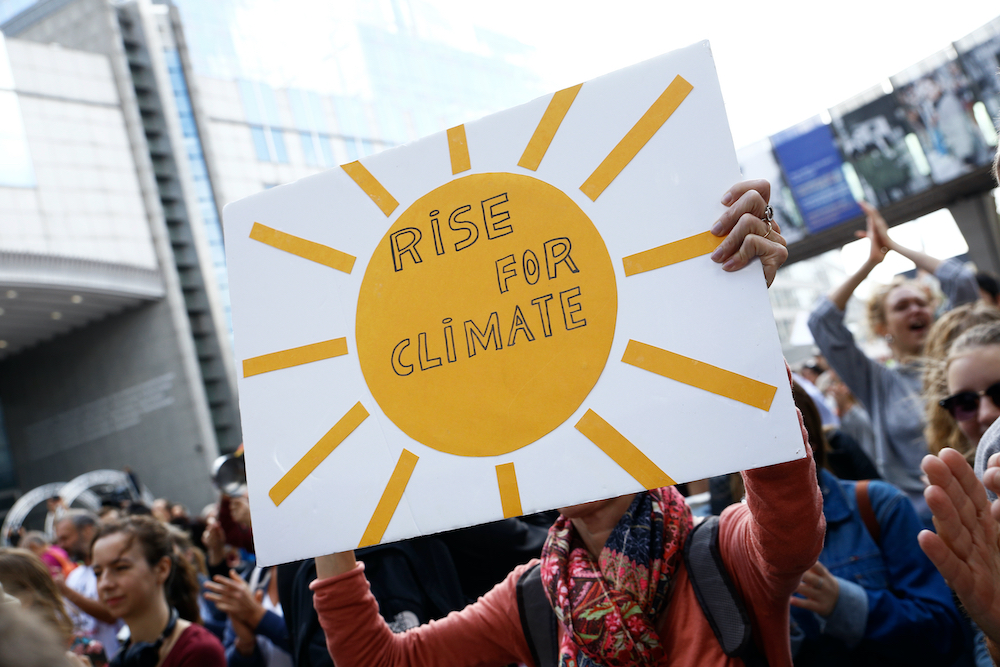ImpactAlpha. Nov. 5 – Voters want climate action. So do investors. Joe Biden has a $2 trillion plan to put it in motion.
“Today, the Trump Administration officially left the Paris Climate Agreement,” Biden tweeted last night. “And in exactly 77 days, a Biden Administration will rejoin it.”
As Biden solidified a lead after clinching two crucial states on Wednesday, attention quickly turned to how the world’s largest economy and second-largest greenhouse gas emitter can reclaim leadership in the accelerating transition to a low-carbon future.
A Fox News poll suggested 70% of Americans are very or somewhat concerned about climate change; 72% favor increased government spending on green and renewable energy. Blackrock joined U.S. and European investors representing $30 trillion in assets to call on the U.S. to quickly rejoin the Paris agreement. Reentering the agreement would send a critical policy signal, Stephanie Pfeifer of the Institutional Investors Group on Climate Change told Reuters, unlocking investor capital for sustainable growth and job creation.
Getting back in
The U.S. is the only country to leave the global agreement reached in 2015. Biden has said he will re-enter the Paris accord “on Day One,” but the U.S. will have some reputational repair work to do and would be expected to announce even more ambitious plans than its previous 2025 goal of reducing emissions 26% to 28% reductions below 2005 levels.
Reductions by then are tracking to between 20% and 27%, according to the Rhodium Group. Reaching net-zero emissions by 2050 – matching pledges from the European Union, Japan, South Korea and other countries – would require cuts of at least 7% a year, every year. And the U.S. would have to offer detailed and realistic plans to hit those goals.
Greentech opportunity
Investors are focused on the tens of trillions of dollars in investment opportunities in the electrification and decarbonization of the economy (here’s a handbook). In the first three quarters of 2020, global investors have poured $4.7 billion into battery storage, smart grid, and energy efficiency sectors of the energy market – almost double last year’s rate of investment.
According to RethinkX, 100% clean electricity from solar, wind, and batteries is “physically possible and economically affordable” across the U.S. and much of the world by 2030.
“We see a clear path for the U.S. to embrace the electrification of everything despite this formal withdrawal,” said Rick Luebbe of Group14 Technologies, a battery materials producer. “We don’t think innovation will be derailed by the current administration’s decision to remove the US from the climate accord.”
Local action
In Denver, voters approved the use of $40 million in sales tax proceeds to reduce greenhouse gas emissions and air pollution. Austin, Tex., voters raised property taxes to fund public transportation aimed at reducing carbon emissions. Even without federal leadership, states, cities and businesses are projected to cut greenhouse gas emissions by 19% from 2005 levels by 2025, and by more than one-third by 2030, according to America’s Pledge, the climate action group backed by former New York mayor Michael Bloomberg and former California Gov. Jerry Brown (see, “Fusing climate action and the SDGs to the COVID recovery”).
“Sandboxes for nature” could speed up environmental innovation
Bipartisan support
Biden’s $2 trillion climate plan includes a national clean energy standard and a goal to reach net-zero in the power sector by 2035. Green energy can also be part of any stimulus package to spur economic recovery from the COVID recession. Opposition won’t disappear, but the U.S. election may have established a bipartisan mandate for climate action.
The Rev. Mitchell Hescox of the Evangelical Environmental Network sees an opening for climate action even without a Blue Sweep. “Look for Democrats in both chambers to put forth a major stimulus package including clean energy, carbon reductions, plugging and clean-up of orphaned oil and gas wells, and provisions for a just transition and environmental justice,” Hescox told ImpactAlpha.
The bipartisan Senate Climate Solutions Caucus is considering a fee on carbon pollution coupled with the distribution of dividends, among other bills. “The majority opinion of U.S. citizens favor climate action, not only for the opportunity to secure a livable world for their children but also as the best way to rebuild the economy and accelerate job creation,” said David Miller of Clean Energy Ventures.











